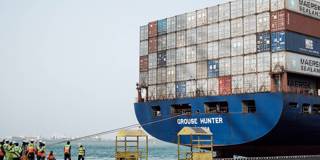While many observers have touted the African Continental Free Trade Area as a game changer for the continent, trade liberalization alone will not necessarily guarantee economic success. Member countries must also implement robust trade facilitation measures, and engage with external partners as a unified trading bloc.
CAIRO – The African Continental Free Trade Area (AfCFTA), which entered into force on January 1 last year, promises to accelerate the diversification of the region’s economies and reduce the impact of commodity-price cycles on growth. Whereas Africa’s external trade is dominated by primary commodities and natural resources, the first shipment under the AfCFTA – from Ghana to South Africa – comprised manufactured goods of the sort that largely drive intra-African trade.

CAIRO – The African Continental Free Trade Area (AfCFTA), which entered into force on January 1 last year, promises to accelerate the diversification of the region’s economies and reduce the impact of commodity-price cycles on growth. Whereas Africa’s external trade is dominated by primary commodities and natural resources, the first shipment under the AfCFTA – from Ghana to South Africa – comprised manufactured goods of the sort that largely drive intra-African trade.